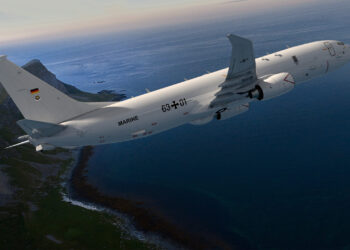As part of the Government’s recovery plan, STX France and DCNS have been awarded the contract to build the French Navy’s third Projection and Command Vessel (BPC) for the French Navy.
Work on the third BPC was launched today in Saint-Nazaire by Hervé Morin, the Defence Minister and Patrick Devedjian, Minister in charge of implementing the recovery plan.
In line with the recovery plan initiated by the Government in order to face up to the challenges of the world economic crisis, the order of the third Projection and Command Vessel called for the creation of a tailor-made industrial organizational structure in order to achieve the budgetary objective fixed by the state. It therefore not only meets the operational objectives of every new ship ordered by the government but also the specific economic objectives of the recovery plan.
With this in mind, it taps into the respective skills of STX France and DCNS. STX France, the prime contractor for the project, will build the platform and fit-out the ship and DCNS, its co-contractor, will produce its combat system.
Due to the extremely tight economic constraints that characterize this project, the ship will be built solely on the Saint-Nazaire site. In fact, the sharing of the construction of the platform between two production sites would have generated additional costs – in particular for transport, interfacing and tests – which would have made it impossible to meet the budgetary target fixed by the Government.
STX France, in charge of the overall coordination of the project for the industrial part, will build the whole of the propelled platform including the fitting out of equipment onboard. This represents 75% of the vessel value. Once trials are completed, BPC 3 will move to Toulon under its own power.
DCNS will manufacture and integrate the combat system, which includes communications, navigation and combat management systems. The tasks involved in its production demand high value added skill levels, in order to enable the BPC to conduct its operational missions, and represent a quarter of the overall cost of the ship.
199 metres in length, with a displacement of 21,000 tons and a speed of 19 knots, the BPCs are distinguished by their large carrying capacity: 450 troops, 16 heavy-lift helicopters, 2 hovercraft, 4 LCMs (landing craft) or a third of a mechanized regiment (1,000 tons), which they are able to deploy worldwide. They are equipped with electric pod propulsion and their high level of automation enables the size of their crew to be reduced to 160. They also boast an on-board hospital for large-scale humanitarian missions. Their particularly advanced communications system, 3D surveillance radar and combat management system (Senit 9) make them ideal platforms for commanding a naval task force.
The first two BPCs, Mistral and Tonnere, built by DCNS and Chantiers de l’Atlantique, were delivered in 2006 and 2007.
A few words about the partners:
STX Europe ASA (former Aker Yards ASA) is an international shipbuilding group which aims to be the leading builder of cruise and offshore vessels. The group has a strong position in terms of developing state-of-the-art concepts, technology, processes and products for customers around the world. STX Europe ASA comprises 15 shipyards in Finland, France, Norway, Romania, Brazil and Vietnam, and is also a part owner of three yards in Germany and Ukraine. STX Europe has approx. 16 000 employees. Formerly known as Aker Yards ASA, the group changed its name to STX Europe in November 2008.
The DCNS group is one of Europe’s leading players on the international naval defence systems market. In order to meet an ever-more comprehensive and integrated demand, DCNS acts as prime contractor for warships and their support vessels, using its own development, marketing and production resources backed up by those of selected partners.
In order to master the complexity of warship production, DCNS applies it expertise in naval architecture, in the engineering of the warship’s principal systems, in the management of assembly and outfitting yards, in the production of special equipment and in support in operational service. The DCNS group has a workforce of 13,000 and a turnover of approximately 2.8 billion Euros.









